人教版九年级上册英语课件
人教版九年级上学期英语课件: Unit4(共29张PPT)

9、要学生做的事,教职员躬亲共做; 要学生 学的知 识,教 职员躬 亲共学 ;要学 生守的 规则, 教职员 躬亲共 守。21.7.2721.7.27T uesday, July 27, 2021
10、阅读一切好书如同和过去最杰出的人谈话。09:08:4009:08:4009:087/27/2021 9:08:40 AM 11、一个好的教师,是一个懂得心理学和教育学的人。21.7.2709:08:4009:08Jul-2127-Jul-21 12、要记住,你不仅是教课的教师,也是学生的教育者,生活的导师和道德的引路人。09:08:4009:08:4009:08Tuesday, July 27, 2021 13、He who seize the right moment, is the right man.谁把握机遇,谁就心想事成。21.7.2721.7.2709:08:4009:08:40July 27, 2021 14、谁要是自己还没有发展培养和教育好,他就不能发展培养和教育别人。2021年7月27日星期二上午9时8分40秒09:08:4021.7.27 15、一年之计,莫如树谷;十年之计,莫如树木;终身之计,莫如树人。2021年7月上午9时8分21.7.2709:08July 27, 2021 16、提出一个问题往往比解决一个更重要。因为解决问题也许仅是一个数学上或实验上的技能而已,而提出新的问题,却需要有创造性的想像力,而且标志着科学的真正进步。2021年7月27日星期二9时8分40秒09:08:4027 July 2021 17、儿童是中心,教育的措施便围绕他们而组织起来。上午9时8分40秒上午9时8分09:08:4021.7.27
2、Our destiny offers not only the cup of despair, but the chalice of opportunity. (Richard Nixon, American President )命运给予我们的不是失望之酒,而是机会之杯。二〇二一年六月十七日2021年6月17日星期四 3、Patience is bitter, but its fruit is sweet. (Jean Jacques Rousseau , French thinker)忍耐是痛苦的,但它的果实是甜蜜的。10:516.17.202110:516.17.202110:5110:51:196.17.202110:516.17.2021 4、All that you do, do with your might; things done by halves are never done right. ----R.H. Stoddard, American poet做一切事都应尽力而为,半途而废永远不行6.17.20216.17.202110:5110:5110:51:1910:51:19 5、You have to believe in yourself. That's the secret of success. ----Charles Chaplin人必须相信自己,这是成功的秘诀。-Thursday, June 17, 2021June 21Thursday, June 17, 20216/17/2021
人教版九年级英语全一册全册教学课件

Unit 4 I used to be afraid of the dark.
人教版九年级英语全一册全册教学 课件
Unit 7 Teenagers should be allowed to choose their own
clothes.
人教版九年级英语全一册全册教elong to Carla.
人教版九年级英语全一册全册教学 课件
人教版九年级英语全一册全册教学 课件
Unit 5 What are the shirts made of?
人教版九年级英语全一册全册教学 课件
Unit 6 When was it invented?
人教版九年级英语全一册全册教 学课件目录
0002页 0051页 0202页 0276页 0319页 0398页 0421页 0479页 0529页 0562页
Unit 1 How can we become good learners? Unit 3 Could you please tell me where the restrooms are Unit 5 What are the shirts made of? Unit 7 Teenagers should be allowed to choose their own Unit 9 I like music that I can dance to. Unit 11 Sad movies make me cry. Unit 13 We're trying to save the earth! Unit Notes on the Text Unit Grammar Unit Vocabulary Index
Unit 1 How can we become good learners?
人教版九年级英语全一册全册完整课件
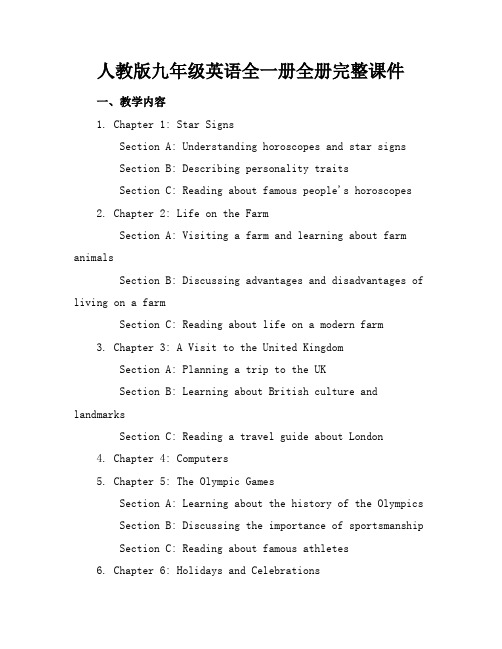
人教版九年级英语全一册全册完整课件一、教学内容1. Chapter 1: Star SignsSection A: Understanding horoscopes and star signsSection B: Describing personality traitsSection C: Reading about famous people's horoscopes2. Chapter 2: Life on the FarmSection A: Visiting a farm and learning about farm animalsSection B: Discussing advantages and disadvantages of living on a farmSection C: Reading about life on a modern farm3. Chapter 3: A Visit to the United KingdomSection A: Planning a trip to the UKSection B: Learning about British culture and landmarksSection C: Reading a travel guide about London4. Chapter 4: Computers5. Chapter 5: The Olympic GamesSection A: Learning about the history of the Olympics Section B: Discussing the importance of sportsmanship Section C: Reading about famous athletes6. Chapter 6: Holidays and CelebrationsSection A: Talking about favorite holidays and celebrationsSection B: Learning about different cultural traditionsSection C: Reading about holiday customs around the world二、教学目标1. 学生能够理解和运用所学词汇和句型,描述个人和事物特点。
人教版九年级上册英语全册课件PPT
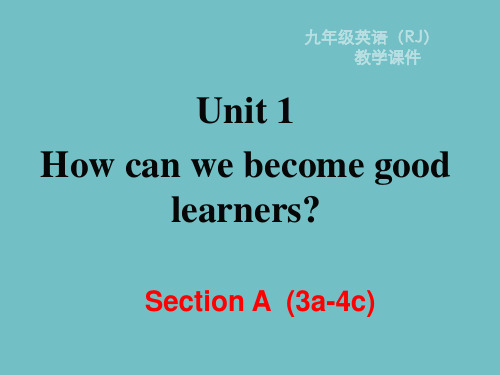
While-reading
How I Learned to Learn English
Last year, I did not like my English class. Every class was like a bad dream. The teacher spoke so quickly that I did not understand her most of the time. I was afraid to ask questions because of my poor pronunciation. I just hid behind my textbook and never said anything.
1) discover v. 发现
2) discover/ invent /find/ /find out/ create 的区别
①I discovered (that) she was a good cook. discover指_________ ,某种_________ ,而以前未被
发现的事物或未为人所知的东西。
九年级英语(RJ) 教学课件
Unit 1 How can we become good
learners?
Section A (3a-4c)
学习目标
➢ Key words & phrases:
expression, discover, secret, grammar, repeat, note, pal, physics, chemistry , memorize, pattern
人教版九年级上学期英语课件: Unit3(共23张PPT)

九年级上册Unit 3
Section A 高频考点精讲 1.The bookstore is on your right, beside the bank. 书店 在你的右边,银行旁边。 (1)辨析beside, besides与except beside prep “在……旁边”。如: You can sit beside me. 你可以坐我旁边。
九年级上册Unit 3
besides “除……之外(包含在内)”。如: There are another three students besides me. 除 我之外还有其他的三个学生。 except prep. “除了……之外(不包括在内)”。 如: I like all kinds of fruit except apples. 除了苹果,所 有的水果我都喜欢。 (2)辨析by, beside, near, next to与close to 上。
九年级上册Unit 3
①by和beside均表示“在……旁边”,常可互换。 如: Come and sit beside/by me. 过来,坐在我边 ②near表示“在……附近”,表示的距离比by和 beside稍远些。如: Don’t play near the road. 不要在马路附近玩耍。 There is a post office near the bank. 银行附近有一 所邮局。
解析:本题考查现在完成时态。从句中for almost 3 years 可知,横线处的谓语动词需要用延续性动词或表 某种状态存在的词,且时态采用现在完成时。
九年级上册Unit 3
3.You don’t need to rush! 不用急! need的用法 need后加to do 说明need为实义动词,用助动词提问 或否定;need后加doing表被动意义;若need后加 do,则need为情态动词,用need提问,肯定回答用 must,否定回答用needn’t。如:
人教版九年级英语全一册全册完整课件
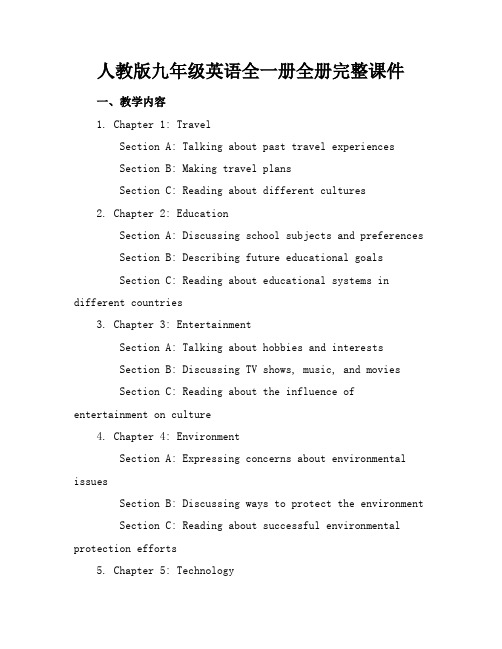
人教版九年级英语全一册全册完整课件一、教学内容1. Chapter 1: TravelSection A: Talking about past travel experiencesSection B: Making travel plansSection C: Reading about different cultures2. Chapter 2: EducationSection A: Discussing school subjects and preferences Section B: Describing future educational goalsSection C: Reading about educational systems in different countries3. Chapter 3: EntertainmentSection A: Talking about hobbies and interestsSection B: Discussing TV shows, music, and moviesSection C: Reading about the influence of entertainment on culture4. Chapter 4: EnvironmentSection A: Expressing concerns about environmental issuesSection B: Discussing ways to protect the environment Section C: Reading about successful environmental protection efforts5. Chapter 5: TechnologySection A: Using technology in daily lifeSection B: Discussing the advantages and disadvantages of technologySection C: Reading about technological innovations6. Chapter 6: HealthSection A: Talking about exercise and healthy habits Section C: Reading about the importance of mental health7. Chapter 7: JobsSection A: Discussing dream jobs and career aspirationsSection B: Describing job responsibilities and qualificationsSection C: Reading about successful entrepreneurs8. Chapter 8: CultureSection A: Exploring traditional festivals and customsSection B: Comparing different cultures and promoting cultural understandingSection C: Reading about cultural exchange programs9. Chapter 9: SafetySection A: Talking about safety rules and precautions Section B: Discussing emergencies and natural disastersSection C: Reading about safety education10. Chapter 10: Life GoalsSection A: Sharing life goals and aspirationsSection B: Setting realistic goals and planning for the futureSection C: Reading about inspirational individuals二、教学目标2. Cultivate students' ability to read and understand different text types.3. Enhance students' awareness of cultural diversity and promote cultural understanding.三、教学难点与重点1. Mastering target vocabulary and sentence structures.3. Improving speaking and writing skills throughpractical activities and reallife situations.四、教具与学具准备1. Multimedia projector2. Whiteboard and markers3. Handouts with vocabulary lists, reading materials, and exercises4. Recording devices for listening activities五、教学过程1. Warmup: Engage students in a brief discussion about the topic of the day.2. Presentation: Introduce new vocabulary and sentence structures through reallife examples and practice dialogues.3. Practice: Provide students with practical activities, such as roleplays, group discussions, and writing exercises.4. Listening and speaking activities: Play audio recordings, and guide students to practice their listening and speaking skills.5. Reading: Assign reading materials and guide students through skimming, scanning, and intensive reading exercises.6. Grammar focus: Explain and practice targeted grammar points.7. Production: Encourage students to create their own dialogues, presentations, or written pieces based on the topic.8. Summary: Review key points and answer students' questions.9. Homework assignment: Provide homework tasks and answer any questions.六、板书设计The board will display key vocabulary, sentence structures, grammar points, and a visual representation of the lesson's structure.七、作业设计1. Write a paragraph about your favorite hob, including why you enjoy it and how often you engage in it.Answer: (Student's paragraph)2. Create a dialogue between two friends discussing their future educational goals.Answer: (Student's dialogue)3. Read the article about successful environmental protection efforts and summarize the main points.Answer: (Student's summary)八、课后反思及拓展延伸Reflect on the effectiveness of teaching methods and student engagement. Consider incorporating additional resources, such as online videos, interactive games, or group projects, to enhance students' understanding and practical application of the topics covered. Encourage students to explore related topics beyond the classroom, fostering a love for lifelong learning.重点和难点解析1. 教学内容的覆盖与组织2. 教学目标的具体化3. 教学难点与重点的确定4. 教学过程的细节设计5. 板书设计的有效性6. 作业设计的针对性与实践性一、教学内容的覆盖与组织教学内容应全面覆盖教材的章节,同时要注重内容的逻辑顺序和递进关系。
人教版英语九年级上册课件:Unit 1 Section B. ppt

3. What are successful learners’ (1h)aCbrietast?ing an interesting in what they learn
and answer the question.
Which four habits of successful learners
arCermeaetinngtiaonniendte?rest in what they learn.
Practicing and learning from mistakes.
new words I learned that day.
6. Learning a new language also helps us to gain some knowledge of the culture of its native speakers.
7. Scientists believe that only humans have the ability to learn a complex language.
also not get bored.
3. Use it or lose it: If you stop doing something,
you will forget how to do it. Practice makes perfect: If you do 4so. mThetehyinlegarn from mistakes, and they are not agaafirnaiadnodfamgaaikni,nygomu iwstiallkbeesc. ome very good at it. 5. Take notes by writing down key words or by drawing mind maps. Look for ways to review what has been learnt, e.g. read the notes ever day or explain the information to another student. 6. (Answers will vary.)
Unit+4课件2024-2025学年人教版英语九年级上册(河北地区)
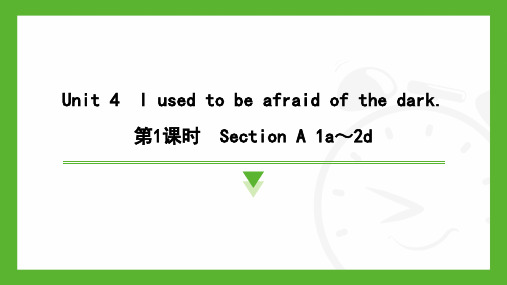
B: Yes, he did. But now he has short hair. A: I think his French is very great. 4. I want to ask him how to learn
French well .
B: Oh, you can come to my house this evening. He can teach you some
2. My primary school has changed (change) a lot these years. It looks
beautiful and clean.
3. It has been two years since we moved (move) from our hometown
六
返回目录
五、 完形填空。
人与社会——历史、社会与文化
Some people still live in their hometowns. But 1 may only return
once or twice a year. Nowadays, millions of Chinese people leave the
一
B. the other
B. Next B. in B. rubbish B. come B. the B. disappeared
C. another D. others
B. care about
D. give away
C. Among D. During
C. at
D. from
C. time
D. food
C. carry
D. return
人教版九年级英语上册教学课件:Unit 1 Section B (1a-2e) (共24张PPT)

Paul finds it difficult to learn English. Listen and complete the learning challenges he talks about.
Challenges 1. He can’t get the _p__ro_n__u_n_c_ia_t_io_n_______ right.
attention to it for a long time.
Choose the key words to help you understand each
Practicing and learning from Use it or lose it.tice makes perfect.Learn from mistakes
5. What study skills does the writer talk about? Do you have those study skills? Creating an interest in what they learn; Practicing and learning from mistakes; Developing their study skills; Asking questions
Examples If they need to learn English and they like music or sports, they can listen to English songs or watch sports programs in English.
Practicing and learning from mistakes
Language points
pronounce v. 发音 pronunciation n. 发音 I can’t pronounce the word correctly. ≈ I can’t_g_e_t _th_e__p_r_o_n_u_n_c_i_a_ti_o_n_r_i_g_h_t_.
九年级上册英语(人教版) 课件

You
Section 3-3b Ask and answer
This is my computer. 这是我的电脑。
所有格
He said this was his computer. 他说这是他的电脑。
Betty is our best friend. (They said…) I likesaid…)
间接引语 一般过去时 过去将来时 过去进行时
过去时态
直接引语
am\is are
间接引语
was were
Have\has
will can do
had
would could did
评价手册 P30
D:Grammar
1. He told Marcia he (will\would) call her tomorrow. 2. Ben said he (can\could) speak four languages.
评价手册: P33 C-PART 1
2. Gina said, “(I ’ll\I’d) see you tomorrow, Dan.” 3. Martin was happy. His parents told him he (can\could) borrow the car. 4. We told our friends that we (go\went) camping every year. 5. The reporter asked, “(Do\Did) you speak Japanese well?”
人教版九年级英语上册课件:Unit 7 (共18张PPT)
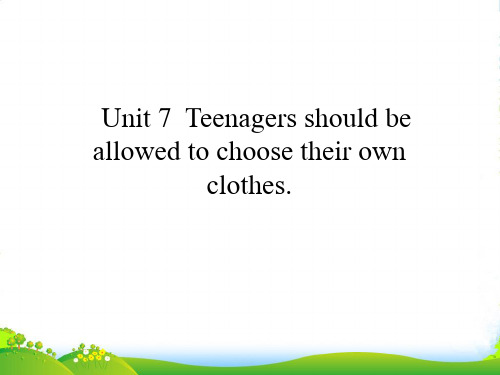
(2)allow doing sth. 允许做某事。如: We don’t allow smoking in public places. 我们不允许在 公共场所吸烟。 (3)be(not)allowed to do sth. (不)被允许做某事。如: Passengers are not allowed to smoke in bus. 公共汽车上 不允许乘客吸烟。
①choose to do sth. 选择做某事。如: He chose to go there by air. 他决定乘飞机去那里。 ②choose + 特殊疑问词 + to do sth. 如: You will have to choose which one to buy. 你将不得不选 择买哪一个。
(3)与keep相关的短语 keep on 继续 keep up 保持;不落后 keep up with 赶得上;和……保持联系 keep in mind 记住 keep in touch 保持联络 keep away from 远离,回避 keep healthy 保持健康 keep an eye on 照看;留意;密切注视 keep moving 继续前进 keep out of 置身于外
(2)含有情态动词的被动语态 含有情态动词的被动语态的构成: 情态动词 + be + 及物动词的过去分词。如: Many trees should be planted in the mountain. 山上应该 种很多树。 This book can be taken home. 这本书可以带回家。 This problem can’t be worked out very easily. 这个题目 没有那么容易解出来。
人教版九年级英语全一册(全套)精品课件

Unit 4 I used to be afraid of the dark.
人教版九年级英语全一册(全套)精 品课件
Unit 5 What are the shirts made of?
人教版九年级英语全一册(全套) 精品课件目录
0002页 0042页 0090页 0274页 0342页 0429页 0431页 0503页 0528页 0588页
Unit 1 How can we become good learners? Unit 3 Could you please tell me where the restrooms are Unit 5 What are the shirts made of? Unit 7 Teenagers should be allowed to choose their own Unit 9 I like music that I can dance to. Unit 11 Sad movies make me cry. Unit 13 We're trying to save the earth! Unit Notes on the Text Unit Grammar Unit Vocabulary Index
Unit 1 How can we become go册(全套)精 品课件
Unit 2 I think that mooncakes are delicious!
人教版九年级英语全一册(全套)精 品课件
Unit 3 Could you please tell me where the restrooms are?
人教版九年级英语全一册(全套)精 品课件
人教版九年级上册英语课件:Unit 1 Section B(2a-2e) (共14张PPT)

• A.on business B.by the way
• C.on your own
D.on the top
• 点拨 句意:对你来说,夜晚独自一人去森林里散步是很危险的。on business出差;by the way顺便;on your own独自一人;on the top在顶部。分析句意可知选C。
• 三、根据中文意思完成句子,一空一词。
• 1.【天津中考】电视开着,但是玛丽没注意看。
• The TV was on,but Mary wasnp'aty_in_g_______a_tt_e_nti_o_n_____________ to it.
• 2.【陕西中考】没有知识,你成功的可能性就会小一些。
这个短语中的to是介词,其后若跟动词,动词应用动名词形式。 • 8.depend on取决于;依靠;依赖。它通常不用于进行时态和被动
语态。
• 9.even if即使,纵然。它引导让步状语从句,可与even though换 用。
• 10.unless conj.除非,如果不。它用于引导条件状语从句,多数情
• 一、根据句意及首字母或中文提示写出单词。
• 1.I see a chance toc_re_a_t_e________(创造) somethiห้องสมุดไป่ตู้g new.
• 2.【2018·江苏宿迁中考】Natural resources are very important
for us and wewsisheloyuld use them ____________(明智地).
• 2.ability n.能力;才能。短语:the ability to do sth做某事的能
力。其形容词为able(能够)。 • 3.create v.创造;创建。其形容词为creative(有创造力的)。
九年级 上册英语 全册教学课件PPT

learned from watching movies. Use words and phrases from the passage.
1. I can understand the meaning by watching their b__o_d_y_l_a_n_g_u_a_g_eand the__ex_p__re_s_s_io_n_s_ on their faces.
Then one day I watched an English movie called Toy Story. I fell in love with this exciting and funny movie! So I began to watch other English movies, too. Although I could not understand everything the characters said, their body language and the expressions on their faces helped me to get the meaning. I also realized I could get the meaning by listening for just the key words. My pronunciation i m p r o v e d as well b y l i s t e n i n g t o t h e conversations in English movies.
Read and Learn
Words and expressions
expression n. 表达(方式);表示
人教版英语九年级上Unit1单元整体课件
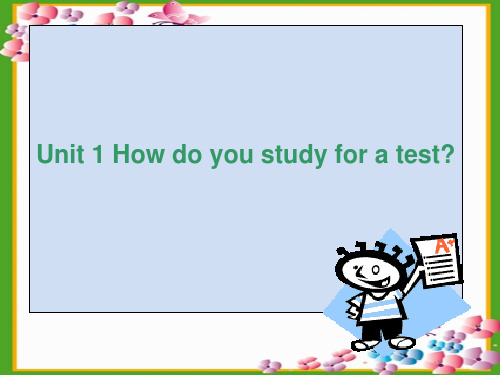
By working with friends
By asking the teacher for help
By reading the textbook
By reading the notebook
book 书 √ flashcard 抽认 卡 × end up 告 终 √ quickly 快 地 √
9. I paid fifty yuan for the sweater. _ _____ ______ did you pay for the sweater? 10. It is windy . __________________________________ 11. I am getting on well with it. __________________________________. 12. ______ is a ticker for the film Hacker He? About forty yuan . A. How old B. How many C. How much D. How often 13. _____ tea did you have? Two cups. A. How many B. How much C. How soon D. Which 14. ______ a year does your school have sports meetings? Twice a year. A. How often B. How soon C. How long D. How many times
第2讲:by的用法总结
“by”的用法
1、介词 prep. 在…旁;靠近 · eg.Our teacher was sitting by the window.
英语人教版九年级全册课件ppt

CD
He was the only little kid at the picnic.
She always listens to pop music. He loves rabbits.
从使用情况来看,闭胸式的使用比较 广泛。 敞开式 盾构之 中有挤 压式盾 构、全 部敞开 式盾构 ,但在 近些年 的城市 地下工 程施工 中已很 少使用 ,在此 不再说 明。
could 和 might
can’t
表示不太有把握 The pen could /
的推测,意为 might be Joe’s. I saw
“可能”。
it on his desk just
now.
表示很有把握的 The girl here can’t be
否定推测,意为 Helen. Helen has “不可能”。 gone to Beijing.
Things in the schoolbag
1. T-shirt 2. hair band 3. tennis balls
从使用情况来看,闭胸式的使用比较 广泛。 敞开式 盾构之 中有挤 压式盾 构、全 部敞开 式盾构 ,但在 近些年 的城市 地下工 程施工 中已很 少使用 ,在此 不再说 明。
从使用情况来看,闭胸式的使用比较 广泛。 敞开式 盾构之 中有挤 压式盾 构、全 部敞开 式盾构 ,但在 近些年 的城市 地下工 程施工 中已很 少使用 ,在此 不再说 明。
2a
Bob and Anna found a schoolbag at the park. Listen and write down the things in the schoolbag.
Linda. 5. It _m_u__st_ be Linda’s schoolbag.
- 1、下载文档前请自行甄别文档内容的完整性,平台不提供额外的编辑、内容补充、找答案等附加服务。
- 2、"仅部分预览"的文档,不可在线预览部分如存在完整性等问题,可反馈申请退款(可完整预览的文档不适用该条件!)。
- 3、如文档侵犯您的权益,请联系客服反馈,我们会尽快为您处理(人工客服工作时间:9:00-18:30)。
人教版九年级上册英语课件第人教版九年级上册英语课件人教版九年级上册英语课件各位老师,下面就是为大家带来的额人教版九年级上册英语课件,盼望这一课件教案可以关心大家。
人教版九年级上册英语课件一、教学目标:语言学问目标:能把握以下单词:chopsticks, coin, fork, blouse, silver, glass, cotton, steel, grass, leaf, produce, widely, be known for, process, pack能把握以下句型:: —This ring looks nice. Is it made of silver?—Yes, and it was made in Thailand.:What is it made of/from?:China is famous for tea, right?:Where is tea produced in China?能够用英语描述及询问物品的制作材料,正确理解被动语态的用法及句子结构。
情感看法价值观目标:了解一些日常用品的制成材料,增加生活常识,养成良好的生活习惯;了解一些地方知名产品或传统艺术品的制作过程以及制作材料,培育学生的民族自豪感及爱国主义精神。
二、教学重难点教学重点:把握本课时中出现的生词能够用英语描述及询问物品的制作材料正确理解被动语态的用法及句子结构。
教学难点:理解被动语态的用法及句子结构。
三、教学过程I . Lead in播放动画片《造纸过程》的视频,让学生们了解这个中国传统发明的状况。
T: Who invented paper first?S1: Can Lun invented it in Han dynasty.T: What was paper made of then?S2: It was mainly made of bamboo.T: was it easy for people to make paper then?S1: No, it was very difficult then.T: What is paper made of now?S3: It s mainly made of wood, bamboo, and cotton.n . PresentationPresent the sentence structure, using thepictures on the big screen:—Whats the golden medal made of?—It s made of gold.—Is this table made of wood?—No, it isnt. It s made of glass.—Is Butter made from meat?—No. It s made from cream?让学生们学习把握be made of/from 句型的用法,及be made of 与be made from 的区分。
两词组都是“由制成的〞之意。
be made of指从原料到制成品只发生了样子改变,没有发生本质改变〔属物理变化〕be made from 指从原料到制成品发生了质的改变,已无法复原〔属化学改变〕。
in. :LearningShow some pictures on the big screen. Try tolearn the new words using “be made of 〞struct ure.Learn the new words: chopsticks, coin, fork, blouse, silver, glass, cotton, steel, grass, leafe.g. This pair of chopsticks are made of bamboo. Thiscoin is made of silver.Is this blouse made of cotton?No, it isn t. It s made of silk.Whats the for k made of?It s made of steel.These pigs like grass very much.a piece of leafKolas like leaves.Ss discuss with their partner and try to learn the new words.Give Ss five more minutes to remember the new words.Work on 1a:Let Ss read the things and materials in 1a.Discuss with their partners and match them with the materials. More than one answer is possible.What are these things usually made of? Match them with the materials. More than one answer is possible.chopstickswindowcoinstampforkblousewoodgoldsilverpapersilkf. glassCheck the answers with the Ss.IV. ListeningT: Tell Ss they will hear a conversation about some things and material. Listen and match the products with what they are made of and where they were made.Things :Made of Made inshirts cotton Koreachopsticks silver Thailandring steel AmericaLet one student read the words in the box, Play the recording for the Ss to listen.Ss try to listen and match the things with the material and here they were made.Play the recording again. Let Ss check the facts they hear.Check the answersPair workRead the conversation in the box in 1c.Ss try to made conversations using the information in 1b.e.g. :A: Your new shirt looks very nice. Is it made of cotton?B: No, it isnt. It s made of silk.Let some pairs read out their conversations.W.ListeningWork on 2a:T: Let s listen to another conversation between Nick and Marcus.s l ookWhat are they talking about? First, let at the pictures and the phrases in 1a.s l ook(Let one students read the phrases in 2a.)Listen and check ( V ) the main topic of Nick and Marcus conversation.the science museumthe art and science fairenvironmental protectiona model planea beautiful paintinggrass and leavesPlay the recording for the Ss to listen and check the phrases.Play the recording again to check the answers.Work on 2b:Let Ss read the sentences below. Explain some main sentences for the Ss. Make sure they know what to do.Let Ss read the questions in 2b. Make sure they understand the meaning of each question.Play the recording for the Ss to answer the questions. :(If necessary, using the pause button.) Where is the art and science fair?Do Nick and Marcus have to pay to go?What is the model plane made of?What is the painting made from?Play the recording again to check the answers.Play the recording again. Let Ss fill in the blanks of the conversation.VD. Pair workTell Ss to make a conversation using the information in2a and 2b.e.g.A: What did you see at the art and science fair?B: I saw a model plane.A: What is it made of?B: It s made of steel, glass, and plastic.Let Ss make their own conversations.Practice their conversations in pairs.ffl. Role -playWork on 2dRead the conversation and complete the blanks.Chinese tea both in the past andnow.I know, tea plants on thesides of mountains.When the leaves are ready, they by handand then for processing.The tea and sent to many differentcountries and places around China.People say that tea healthbusiness!Read the conversations and Let Ss read after theteacher.Explain some new words and main points in the conversation.Ask Ss to role-play the conversation in groups.Language points1. What is the model plane made of?What is the painting made from?be made of 与be made from 辨析两词组都是“由制成的〞之意。
